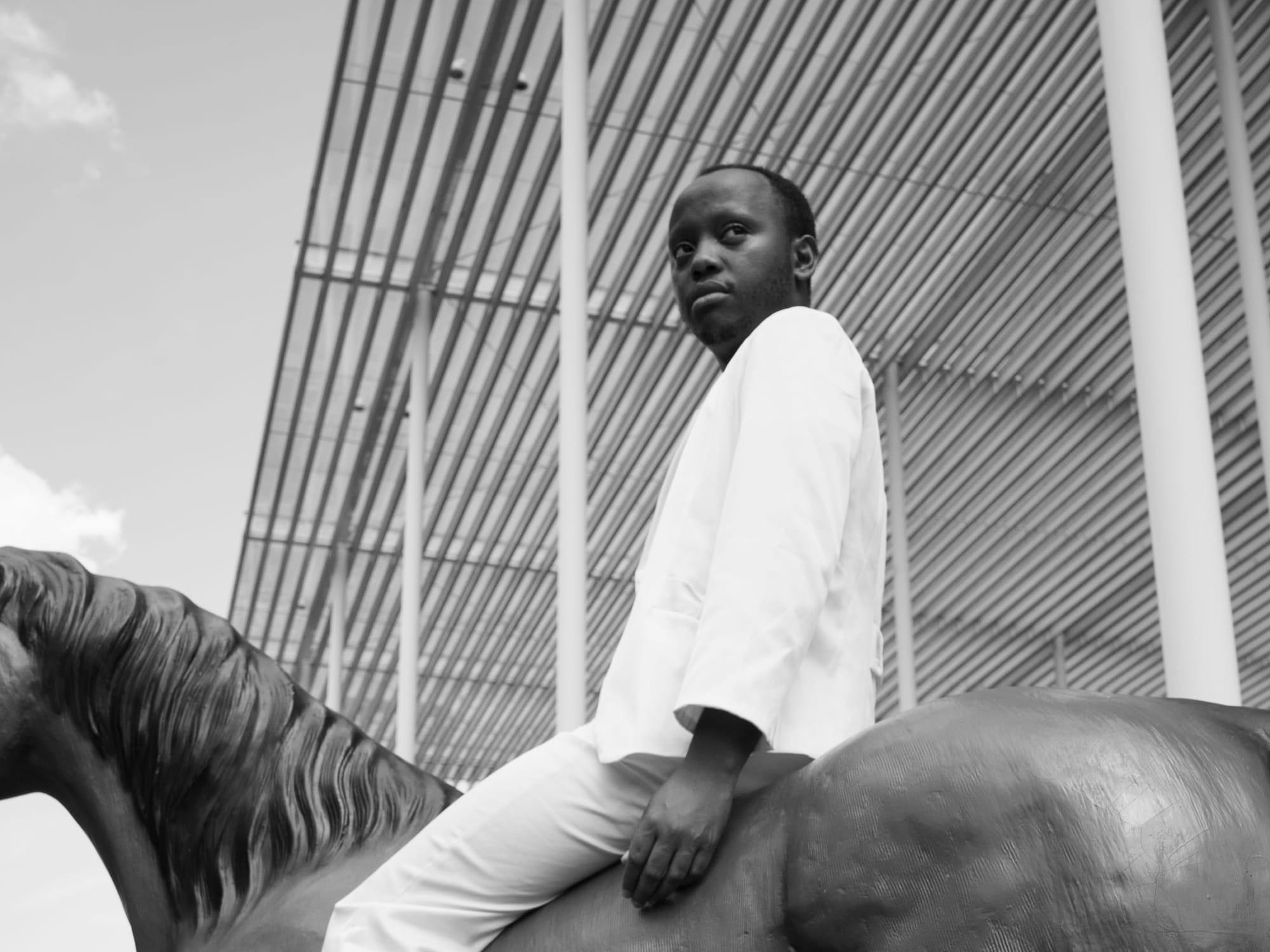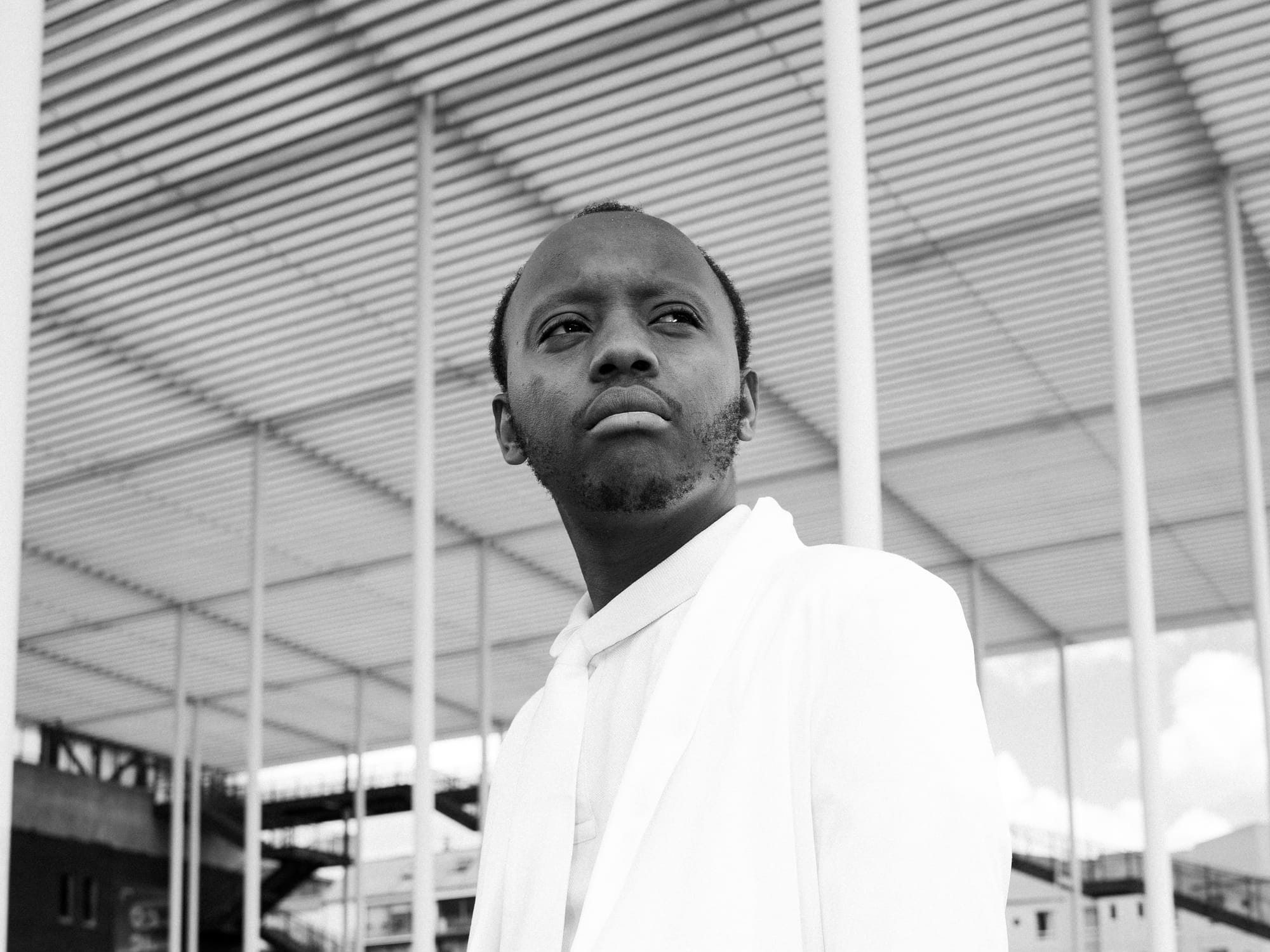Hubert Tuyishime is bridging cultures, identities, and styles. As Porcelain id, the artist who migrated from Rwanda to Antwerp, Belgium, released their album Bibi:1, which received exceptional praise.
«We are only at the beginning of this calendar year, but this album could easily end up on many end-of-year lists in ten months’ time,» writes Bryan Regtop for «Dansende Beren».
The resonance had been «honestly amazing», Tuyishime tells Negative White in an interview via video call. «I got much more press than expected,» adding that keeping expectations low was a form of self-protection. «The feedback from fellow musicians was a different kind of acknowledgement. People who are better at what you do are into what you created.»
Bibi:1, released mid-February, is a highly condensed debut album containing eleven tracks, with Feeling being a short interlude in the record’s middle.
But most of all, it is a stunning work of art. Porcelain id provides at its core a folky canvas yet paints with a vast pallet of colours—indie-rock strokes, dots of electronica, faint brush tips of hip-hop, even splashes of experimental noise.
The songs effortlessly blend Western sounds with exotic elements. Some, like Low Poly or Adam Coming Home, conjure memories of The Libertines. The opener, Habibi (R U Alone?), and closer, Lights!, remind us of Nick Cave.
Occasionally, Porcelain id plays with reduced compositions—as in Moon—emphasising effects and melody. Then again, indulging in opulent grand gestures in Man Down!.
The duality, juxtapositions, harsh breaks, and sophisticated contrasts within Bibi:1 are deeply rooted in Tuyishime’s story. On the one hand, their musical upbringing brought a wealth of versatility. This diversity of influences led to the conclusion never to choose just one thing.
Then again, the album is inspired by the city’s neverending buzz. «There is never just one thing going on. You can’t really catch a break,» Tuyishime explains. «I come from a small village, so most of my world has either been on the internet or a very small group of friends or community.»
Being in the city for the first couple of years was a shock, artistically expressed in Bibi:1 through its variety of sound, or as they put it: «It would have been a shame if I only picked a single genre or experience to be the album,» Tuyishime elaborates.
«It’s about culture; it’s about finding your identity.»
The intense collaboration of Tuyishime and producer Youniss Ahamad further drove the experimental sound. Ahamad brought a significantly different musical background to the table. Ahamad started weaving non-Western elements into the sound, like the extensive use of the duduk.
«These elements brought an almost literal soul to the album. We could have done it without it. It could have been a trumpet or anything else. But it very much is not, so it goes into what Youniss works around a lot in his music. It’s about culture; it’s about finding your identity.»
Tuyishime has a hard time illustrating the significance of these sounds: «Those sounds, really… I don’t know. It’s like trying to explain who you are. That’s really hard. Youniss brought me an opportunity to find some kind of identity, to connect me to a culture that was close but I did not grow up with. It is one of those things that I will keep studying and looking into.»

«The upward failing of trying to sound like someone. I’ve tried my whole life, and I still do probably.»
The diverse sounds, paired with its sometimes sharp contrasts, make Bibi:1 objectively not easily accessible. However, you can feel the convolution of different streams coming together. And somehow, despite all of it, you can relate to the song’s high emotionality.
«I think people connect with the way I sing. I’ve had the privilege to work with artists who understand my ambitions for the sound but also pushed me towards accepting the way I sound and not compromising that in any way.»
However, Tuyishime does not think of themselves as much of a singer: «A lot of people can sing well, so it’s not that special. But the skill I try to learn, if that’s even possible, is to bring a song as real as you can. I could learn my songs in a very technical way and I would probably sound better as a singer. But it wouldn’t necessarily translate all the minute details I need to be in there to be able to sing them properly.»
But does technical skill really matter? Music history is full of people who are objectively not great singers, most famously Bob Dylan, yet they manage to touch people nonetheless.
«What do you perceive as a singer or vocalist? And what standards do you put on them? Bob Dylan and Sam France from Foxygen are two very different singers. One of them is the original, and then Sam sounds like all his influences. Because he tries to sound like them but is unable to, he becomes another sort of vocalist.»
Porcelain id sees themselves as the latter type: «It is very true to me as well. The upward failing of trying to sound like someone. I’ve tried my whole life, and I still do probably. So far, that you don’t even know whether you sound like yourself or whatever came from trying to sound like anyone else. But you don’t have to be technically good; just try to bring something as honest as you can.»

«I guess if it’s always been a way of coping, there is no way that it doesn’t affect how I write in the future.»
Authenticity is Bibi:1’s key ingredient. While the apparent layers of cultural clashes and sonic juxtapositions are intriguing, understanding Porcelain id needs an even deeper understanding of Hubert Tuyishime.
«I experienced a lot of different heartbreaks, and the way I dealt with them wasn’t necessarily healthy. The album does sound like the way I went through those hardships. It was a lot of ups and downs, and sometimes, I would be kinder to myself; other times, I wouldn’t.»
Born in Kigali, Rwanda, Tuyishime migrated to Belgium in 2007, accompanied only by the mother, as the Rwandan government prohibited the departure of the father and the sister. Hubert, however, could go because doctors could not diagnose their kidney disease. Following a dialysis treatment, a kidney transplantation was necessary at the age of 12—and countless hospital stays came with it.
In 2012, Tuyishime’s father and sister also came to Belgium. After several movements in social housing, the family is finally reunited.
Nevertheless, these traumatic, existential experiences shaped Hubert Tuyishime into the songwriter they are today: «It shaped me in many ways I’ve yet to understand or even be able to understand. I started writing consciously around 12 or 13. I spent a lot of time alone. Writing as a means of working through anything has shaped how I write and sound.»
Tuyishime describes their process as mood boarding: «I collect sounds, images, specific references to whatever situation it is, and I’ll just leave it at that. I’ve been working like this for so long that I also think like this. It’s almost borderline obsessive at times. But I guess if it’s always been a way of coping, there is no way that it doesn’t affect how I write in the future.»
Porcelain id’s challenge as a songwriter is not to get bored by themselves. Wanting to push further is engrained in their will, and they are not frightened by the abstract. «I could go as vague as anyone could ever be, but somehow, I have to be able to sound as if I mean what I’m saying—even if people actually have to listen to the lyrics, which is another thing. I’m not that hard to read. I think people make me much more complicated than I truly am…»
Why does Tuyishime think that?
«I came to this country, I got into whatever it is that the culture is, and that is perceived as truly strange. Hilarious.»
«It’s like Charlie Chaplin. If you only know the character, it’s hard to imagine there must be more. It seems very complicated when you see me light-hearted and happier and then hear certain stories or how the music sometimes sounds. It complicates the expectations people have.»
However, culturally, being in Belgium and very much into «what is perceived as Flemish music» also defies expectations towards the artist. Tuyishime deploys a bone-dry sense of humour when discussing their migration and assimilation into Belgian culture.
«It is hilarious. I came to this country, I got into whatever it is that the culture is, and that is perceived as truly strange. Hilarious. I assimilated as well as anyone could have done. But still, there’s no winners.»
«Obviously, people contain multitudes. I am not one thing. But lyrically, I’m still a poet first and a musician second. And I take the freedom to do whatever I like. But if you just read the lyrics, I do try to invite people. If I wanted to estrange people to my music I very much could, but I don’t think this album is that. There are very abrasive moments because that’s the song, because that was the thing going on in the sound.»
Tuyishime refers to Reach Me / Reaching Higher, the album’s most disruptive force, where Youniss goes all out on the beat created by Tuyishime.
But it was not an attempt to irritate or estrange, but rather to set the stage for the album’s final song: «You could come out of a party on the worst day of your life, and that’s what it will sound like. And then you still have to get home, and that’s Lights! then. So, am I complex as a human? Probably. But musically, I’m not that hard to read.»

«The only thing I was building towards was making it as a musician. And when that goal seemed to move further away each month, things just fell apart. Literally, my identity just fell apart.»
Whether or not Porcelain id’s music is overcomplicated by people when they know the artist’s story, one thing remains true: Music is an indispensable coping mechanism for Hubert Tuyishime. And naturally, it comes at a personal risk of laying one’s soul bare in public.
«I have asked myself ever since I dreamed of standing in front of thousands and thousands of people: Why? Why bother even? I think it’s part of a dream that began when I realised you could be a performer. When I saw Michael Jackson’s Don’t Stop ‘Til You Get Enough.»
Porcelain id admits the maybe unhealthy nature of this relationship to music and coping:
«It could be healthy, but there was a time when I quit making music because there was no other way I could cope. And life gets in the way of so many things, including making music. Then, for the first time, I hit the wall. For almost all my teenage years, the only thing I was building towards was making it as a musician. And when that goal seemed to move further away each month, things just fell apart. Literally, my identity just fell apart.»
«There must be other ways, hopefully… So, yeah… Don’t know, should as a psychologist probably.»
«So, I don’t know why I want to share music. But I’m hoping that getting older and working with others, seeing how others make music, and seeing their reasons why will help me mature to see music not only as a coping mechanism but also as a thing to share because it can help me connect to others and learn about their experiences.»
«It is an obsession; it very much is. I hope to get more out of it because I love the greatest moments when things go well on stage or I feel something from an audience. The singing together, no matter how bad or how out of fucking tune I am, mostly. I hope to find more of that. I feel like… I’m kind of done with just having it as a coping mechanism. There must be other ways, hopefully… So, yeah… Don’t know, should as a psychologist probably.»
But it is because of the difficult times that Tuyishime became a musician. When having to stay for extended times at the hospital, they attended music therapy—and music became the only true constant in their life.
«It must have been love at first sight. It’s unconditional. At the end of my teens, I thought: If I cannot make it as a musician, what’s the point? But I still made demos. I kept recording without knowing if it would become anything. It is an unconditional love.»





